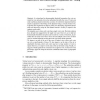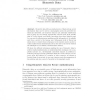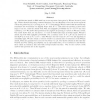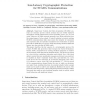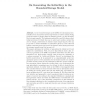242 search results - page 47 / 49 » Randomness in Cryptography |
113
click to vote
ACNS
2005
Springer
15 years 8 months ago
2005
Springer
Abstract. In voting based on homomorphic threshold encryption, the voter encrypts his vote and sends it in to the authorities that tally the votes. If voters can send in arbitrary ...
121
click to vote
EUROCRYPT
2005
Springer
15 years 8 months ago
2005
Springer
Biometric data offer a potential source of high-entropy, secret information that can be used in cryptographic protocols provided two issues are addressed: (1) biometric data are n...
112
Voted
PKC
2005
Springer
15 years 8 months ago
2005
Springer
A well-known attack on RSA with low secret-exponent d was given by Wiener about 15 years ago. Wiener showed that using continued fractions, one can efficiently recover the secret-...
118
click to vote
ACNS
2004
Springer
15 years 8 months ago
2004
Springer
Abstract. Supervisory Control And Data Acquisition (SCADA) systems are real-time process control systems that are widely deployed throughout critical infrastructure sectors includi...
142
click to vote
EUROCRYPT
2004
Springer
15 years 8 months ago
2004
Springer
Abstract. In the bounded-storage model (BSM) for information-theoretically secure encryption and key-agreement one uses a random string R whose length t is greater than the assumed...
